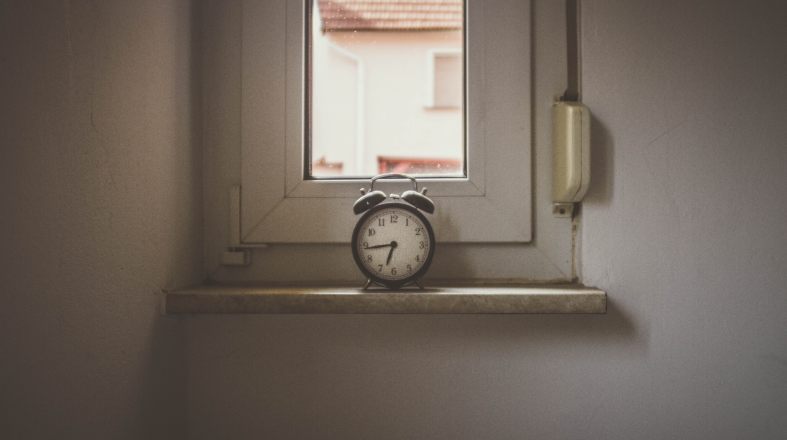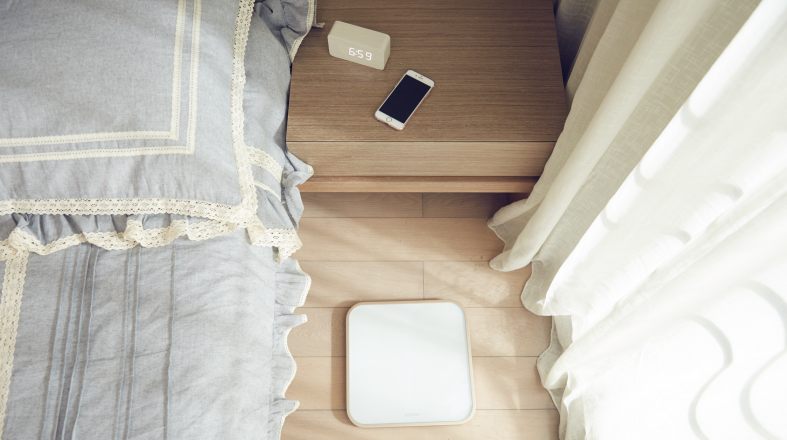Do you reach for the snooze button as soon as your alarm goes off?
You know you shouldn’t do it, but you can’t help yourself. You tell yourself, “just a few more minutes,” and you crawl back under the blankets, only to be rudely woken up again nine minutes later. You press snooze again, because, after all, you didn’t really get the full nine minutes of sleep.
By the time you finally get out of bed it’s been twenty, thirty, or even forty minutes.
Here are some top tips about how to stop snoozing once and for all.
Why Is the Snooze Button Bad for You?
When General Electric introduced the first alarm clock with a snooze button in 1956, the idea was that you could wake up gently and at your own pace instead of being jolted awake by a screeching buzz.
A few extra minutes of snuggling with your partner or pet before starting your day is okay, and the snooze button is a fantastic insurance policy for making sure you don’t fall back into a deep sleep and miss your morning meetings, but things have gotten out of hand.
Pressing snooze, even just once, provides you with close to zero benefits, and could even be harmful to your health. The reason is that people sleep in cycles of about 90 to 110 minutes. During these cycles, humans experience five stages of sleep ranging from light sleep to deep sleep and REM (rapid eye movement). To feel rested, people need to spend enough time in REM, which happens at the tail end of a sleep cycle.
Typically, as the night goes on, the REM cycle lengthens. But, when someone presses snooze, they’re depriving the body of REM. These periods of fragmented sleep are not restful, and they can make you feel even groggier.
Breaking the Snooze Addiction
The first step in breaking the snooze addiction to is to ensure that you’re getting enough sleep. Most Americans are sleep deprived, which makes hitting snooze in the morning a nationwide epidemic.
By getting enough sleep, you should be more likely to wake up in the morning ready to face the day without crawling back under the covers. Everyone’s sleep needs are different, with some people able to thrive on just 6.5 hours of sleep while other people need a couple more hours.
The trick to getting enough rest is to determine your wake-up time and then plan your bedtime accordingly. So, if you need seven hours of sleep and you have to be up at 6 a.m., you should be asleep by 11 p.m. and in bed by about 10:45 p.m.
The number of hours isn’t the only thing to consider when breaking the habit. You can also increase your chances of waking up feeling rested by timing your sleep schedule to correspond with sleep cycles. If you wake up in the middle of a 100-minute sleep cycle, for example, you may be more tired than if you woke up at the end of one.
Waking up at the end of a cycle could be even more important than the number of hours you spend asleep. If your sleep cycles tend to be 90 minutes in length, then you may want to plan your sleep schedule so that you wake up at the end of a 90-minute increment. That would mean sleeping either 6.5 or 8 hours.
Ironically, sleeping 7 hours may leave you feeling less rested than sleeping for 6.5 hours, which explains why sometimes you wake up feeling exhausted even if you clocked plenty of hours in bed.
Read More: How Much Sleep Do We Need?
Tips to Avoid Hitting It
Put Your Alarm Clock out of Reach
You’ve heard this tip plenty of times, but it bears repeating. Having to physically get out of bed to press the snooze button sets you up for success better than if your alarm clock or smartphone is within arm’s reach of your pillow.
The trick is to avoid coming back to bed after you’ve pressed the snooze button!
Use Rewards
If you have something to look forward to as a result of getting up early, you may be able to resist the siren song of the snooze button. Perhaps you allow yourself to have a special treat for being up early or you schedule some time to read a good book, extend your beauty routine or chat with a friend or family member who lives in a later time zone.
By having something fun or exciting to enjoy, you should be more motivated to get out of bed.
Smell a Cup of Coffee
About 80% of Americans rely on coffee to wake them up in the morning. Smelling fresh coffee can be a strong motivator to rouse you out of bed. Set the machine the night before to begin brewing a pot 10 minutes before your alarm goes off.
The smell of coffee can activate the genes that wake you up. Plus, you’ve got a nicely brewed cup of coffee already waiting for you as soon as you leave the bedroom. You don’t have to fumble with the machine and then wait for the coffee to be finished.
Heat Your Room
It can be hard to leave the warmth and comfort of your bed when the room is chilly. The amount of willpower to leave that cozy cocoon is enormous. To combat this, have your bedroom heated in the hour before you wake up, so it’s easier to emerge from the bedsheets. A timed heater or thermostat should do the trick.
If you don’t have that option, drape a blanket or warm robe across the room and wrap yourself up when you leave the warmth of your bed.
Go to Bed Earlier
Even though this strategy is common sense, it’s often overlooked. If you go to bed later than you should, you’re bound to wake up tired. Plan your nighttime routine accordingly so that you can get the sleep you need.
Train Your Brain
If you’ve been hitting snooze for years, you may have to break the habit and establish a new normal. There’s a simple training method that should get you in the routine of getting out of bed when the alarm goes off. It works by “practicing” getting up as soon as the alarm goes off.
Here’s what to do to practice:
- Lie down in bed at a predetermined time during the day. This is not a nap, so don’t plan on falling asleep, but if you do happen to drift off, it’s okay.
- Set your alarm for a few minutes later. It could be three, five, or ten minutes.
- When the alarm goes off, get out of bed and resume your day.
- Repeat until you’re an expert.
This technique works because it gets you in the habit of getting out of bed when you’re not tired, and you end up training your brain and body to the point where it becomes automatic to get up without a second thought.
Glue Your Snooze Button
When all else fails, superglue your snooze button so that you can’t use it, no matter what.
Appreciate Waking Up
As people get older, they tend to lose the joy and enthusiasm for what the day could bring. Remember being a kid and being excited to wake up to see what Santa brought. Well, as an adult, you have the power to make every day Christmas.
And no, not every day is opening presents and eating candy canes. As an adult, you get to choose your own adventure in life. Instead of dreading the expected (traffic, boring meetings, confrontations with coworkers), look forward to new opportunities you can create for yourself.
Interested in exploring futher? Check out other benefits of waking up early.
Set an Alarm You’re Happy to Wake up To
No one loves the sound of a buzzing alarm. Switching out the alarm tone on your smartphone doesn’t make the situation any better. Why not choose to wake up to a song you love? Pick something upbeat and motivational. Just make sure you switch it out every few weeks, or you may grow to have negative associations with a song you once loved.
Have a Reason
You’ve probably noticed that it’s easier to wake up at 4 a.m. when you need to catch a flight or prepare for an important test. It’s almost as if some part of the body was lying awake and ready to spring into action the moment the alarm sounded.
Having a compelling reason to get out of bed should help you avoid the temptation of pressing snooze. If you don’t have to get to the airport before the sun comes up, try creating a reason. Perhaps it’s waking up early to learn how to play an instrument or study a foreign language.
Set a Goal
If you’re addicted to hitting the snooze, the idea of never being able to press that little button again can be panic-inducing. You don’t have to go cold turkey, though. Instead set a short-term goal to start. Plan for a week, month or quarter of no snoozing. Then, as you get closer to your goal, keep extending the time frame.
Turn on the Lights
We all know that waking up when it’s dark and getting out of bed takes a tremendous amount of willpower. To make the transition from sleeping to waking easier, try turning on the lights to mimic sunlight and get your day going.
Drink Some Water
Drinking a glass of water as soon as you wake up should replace all the vital fluids you lost while you were sleeping. It also serves to wake you up. By the time you walk to the kitchen and pour the water, you should probably start to feel more like a human and less like a zombie. Also, if you drink cold water or add a lemon wedge, you could get a burst of energy, too.
Commit
Being accountable can also help keep you on track. You might want to consider partnering up with a fellow snooze button addict and planning on texting or calling each other each morning to ensure that you’re both up. Anyone who misses their check-in could have to pay a penalty for their lapse.
If you don’t have an accountability partner, why not enlist the help of your entire network of Facebook friends? BetterMe is an app for iOS and Android devices that will publicly shame you on the social network if you miss a goal such as pressing snooze or skipping a workout.
Snooze-Busting Gadgets
Clocky
Clocky is an adorable little gadget that looks like R2D2 and even sounds somewhat similar. When it’s time to wake up, he starts chattering away and jumps and rolls across the room. You’ll have to catch him to turn him off!
Loud Alarm Clock
One alarm clock is so loud that it’s called the Sonic Boom. Not only is it virtually guaranteed to wake you up, but it should also wake up those around you. That could also be a huge motivating factor to get you going in the morning!
See Our Guide: Best Alarm Clocks for Heavy Sleepers
Smart Alarms
A smart alarm clock is designed to wake you up at the times where you should be most ready to wake up. They detect what sleep cycle you’re in, and they are designed gently rouse you at the right time. Standalone devices are available to assist with this, or you could use a smartphone app like Sleep Cycle.
Frequently Asked Questions
What are the alarm clock apps for heavy sleepers?
Heavy sleepers need a little extra help when it comes time to wake up, and not surprisingly that are lots of apps available, many of them free.
The Alarm Clock Xtreme & Timer for Android has millions of downloads. You can set it to be annoyingly loud with either a song or pre-loaded soundtrack. If that fails to wake you up sufficiently, you could even be required to solve a math problem before the thing turns off.
For iOS users, the Alarm Clock for Me (also available for Android) has a variety of customization features for alarm options that build in volume, lighting settings, and the ability to add your own soundtracks. You can even decide if you’ll have to solve a math problem or shake it a ton before being able to turn it off.
What happens when people hit the snooze button so much?
Hitting snooze excessively can make you drowsier. You get less quality, restful sleep, which could contribute to feeling more tired during the day. As you deprive yourself of deep sleep, you could also compromise your health.
From a motivational and self-esteem standpoint, it’s not a far stretch to say that people who press snooze over and over again probably don’t feel great about how they started the day. They probably regret cutting their morning routine short, and they may even come to the realization that if they can’t even manage to get out of bed without pressing snooze, they may struggle to accomplish other tasks as well.
Can the snooze button ruin your sleep?
Yes, absolutely! Pressing snooze causes fragmented sleep and deprives the body of the deep restorative rest it needs to heal and repair. Instead of pressing snooze, set your alarm for the time of day that you genuinely need to get out of bed in the morning. That way, you don’t leave time in your morning routine for pressing snooze, and you can dedicate those extra minutes to achieving deep sleep.
Conclusion
Simply reading this article is not going to wipe away the morning struggle of hitting the snooze button. In the early morning hours, it’s almost as if your rational mind is gone and replaced by a master negotiator who wants nothing more than a few more minutes of rest.
To combat the dark side of your psyche, it’s important to set yourself up for success. Practice the tips that have been outlined, and if all else fails, remember that tomorrow is another day, and you can try again to beat the battle with the snooze button.
More Reading:

Jill Zwarensteyn
Editor
About Author
Jill Zwarensteyn is the Editor for Sleep Advisor and a Certified Sleep Science Coach. She is enthusiastic about providing helpful and engaging information on all things sleep and wellness.
Combination Sleeper



